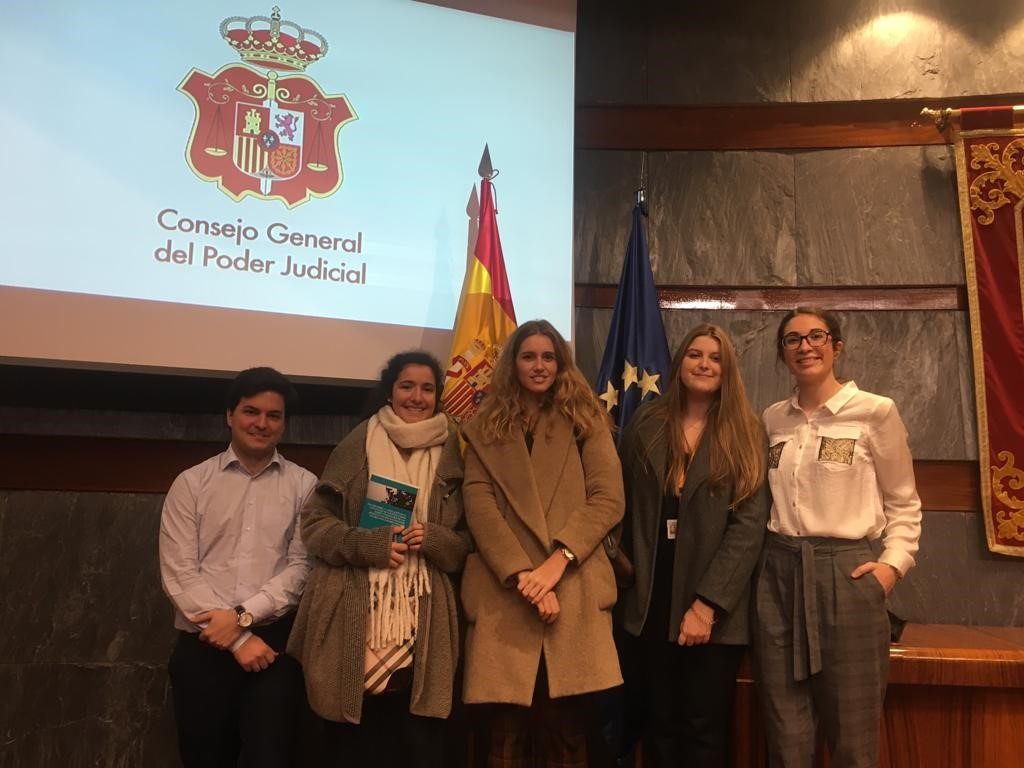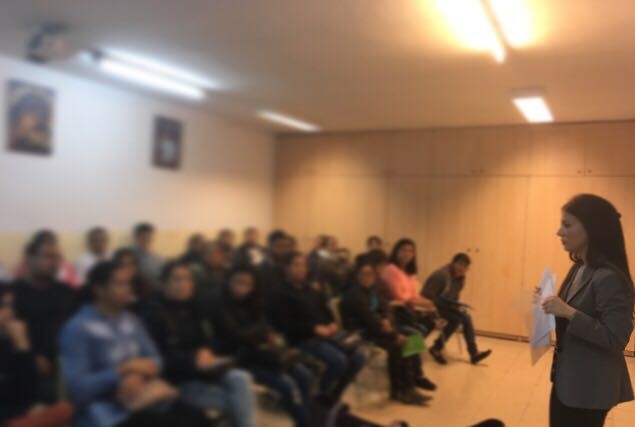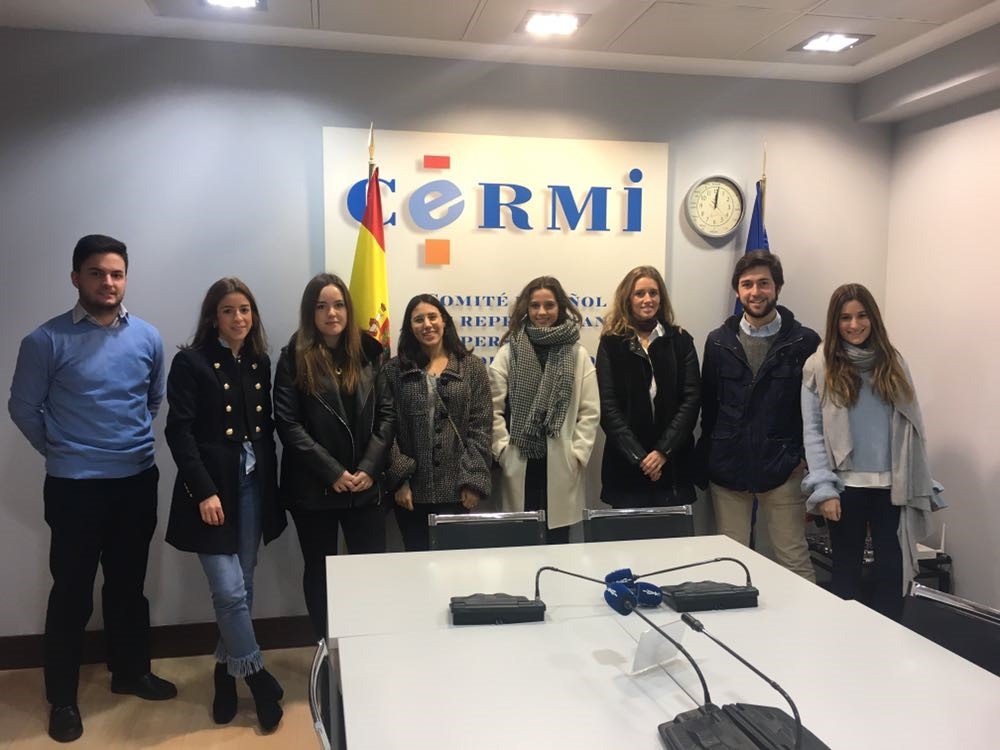Interview with Pilar López de la Osa, from Villanueva University (Spain)
Our partners from Spain, Work for Social, had the chance to get to know the work of Villanueva University (Madrid, Spain) in the field of Service Learning at the Law Faculty. In this interview with Pilar López de la Osa, we discover their work and the impact that it has in their students.

- Could you introduce yourself and would you share a little bit about your background?
I got my PHD in Administrative Law from the University of Alcalá (Madrid) and have been professor at Villanueva for almost ten years. Currently I am the Director of the Law Degree and I also coordinate the Double Degree in Business Administration and Law. I have cooperated with the European Parliament in Brussels and with the Spanish Constitutional Court.
As for my research activity, I am the author of two books and of numerous papers that have appeared in high impact law journals. I regularly attend and take active part as speaker in law conferences, and I have had research stays in the University of Passau (Germany) and in Harvard University (United States).
Since 2014 I am in charge of coordinating the Legal Clinic at Villanueva
- What is Legal Clinic in the frame of a Faculty of Law?
A Legal Clinic is a school aid program aimed at providing pro-bono legal consultation services by faculty students, under the supervision of their professors, to underprivileged clients or to clients that deal with socially sensitive issues.
Legal Clinics provide students with an opportunity to practice their hands-on legal skills while at the same time improving their awareness of the most pressing societal issues of the world they live in.
- Why and when did de Villanueva Legal Clinic start?
The Villanueva Legal Clinic started in 2014 as the brainchild of professors Mercedes de Prada, former Director of the Legal Department of Centro Universitario Villanueva (then associated with Madrid’s Universidad Complutense) and me.
At the time we both had already a long record of social engagement in various sensitive areas and projects, and strongly believed that our students would benefit, personally and professionally, from the combined efforts of practicing and developing their recently acquired legal skills in a social environment that was both unfamiliar and challenging.
Currently, the daily work will be impossible without the invaluable help of Professor María José Valero, Ph.D.

- How does the Legal Clinic work? What are the services offered withing the Legal Clinic? What courses are involved within the Legal studies?
To date, the Legal Clinic offers three main services to its clients.
Pro-bono activities:
A first line of engagement involves direct field work by our 4th year and Masters Degree students, either through scheduled face-to-face legal consultations with targeted clients, or through other outreach activities like organizing workshops on specific legal topics for a client association.
In these cases, the first step in the work of the Legal Clinic is to identify and reach out to potentially interested clients such as NGOs, and offer them our students’ consultation services. Usually a framework agreement is signed by the Faculty of Law and the client. Case by case projects are then identified and agreed upon. The specific means of collaborating with clients are reevaluated by both parties at the beginning of each school year to better adapt to changing needs.
Academic activities:
Our 1st to 3rd year students are also involved in other projects, like producing informative legal documentation that is then distributed to target clients who may have no other means of accessing this information or translating relevant legal material into Spanish to facilitate its dissemination among our clients.
Research:
A third line of engagement involves academic research on legal topics that are relevant to our clients. Each year our clients propose our 4th year and Masters Degree students lines of work for their Trabajo de Fin de Grado (Final Degree Thesis), which is the leaving paper that every undergraduate law student must write and publicly defend in Spain in order to obtain his or her degree, and their Trabajo de Fin de Master (Masters Degree Final Thesis). The results of the research carried out by the students are then shared with the proposing client, who in turn uses it to improve its legal services to clients, creating a multi-layered aid structure of socially invested actors.
As to the courses involved with the Legal Clinic, they are as many and varied as the projects proposed by the clients.
- Do the students get credit points for their participation in the Clinic?
Not so far. We are currently considering this option.
- Is there any selection process for the students?
There is no formal selection process for the students as such, but the supervising professors are very careful to choose for each project students that have provennot only proficient legal skills, but also a sensitivity towards pro-bono activities and social issues.
- How many students participate in the clinic per year?
Each year about ten new students participate in the clinic. They usually stay with us until they leave Villanueva… and beyond…

- Is it easy to find students who want to participate in the legal clinic?
I would not say is particularly easy, but it is not very difficult either. It is rather easy for students that are sensitive to social issues to be immediately drawn to the projects offered by the legal clinic. It is more difficult for them to remain engaged as the months go by. Eventually, it comes down to them finding the right balance between a Clinic work that they have voluntarily chosen and the demanding workload of the courses. Our Clinic students usually succeed and come out the other end significantly more mature, personally and professionally.
- What do you think are the benefits for the students and for the university?
As I have mentioned before, the students benefit personally and professionally form their work in the Clinic. First, they hone and put to the test their legal knowledge, but also many other soft skills that are as necessary to a successful professional career. Also, when faced with real day to day problems, and not only the fabricated cases of the courses, they become increasingly sensitized to pressing social issues that many times go unnoticed by society at large.
As for Villanueva as a University, the main goal is to show society at large that we are an academic community that is committed to educating students not only in professional skills, buy also in social values and responsibilities, making them aware that they owe it to themselves to reach out to the weakest members of our world.
- Which lessons would you say you have learned since the legal clinic started?
I would say the main lesson I have learnt is that sometimes we can be very harsh in our judgment of the younger generations, very prone to question them, when in fact they have proven to me, time and again, that their awareness of and their compromise towards society is knowledgeable and strong. Also, that despite their age and their budding legal skills, our students can do so much more than what we believed them to be capable of.
- What is your hope for the future of the Villanueva Legal Clinic?
I hope for the Villanueva Legal Clinic to continue growing and expanding, not only in the number and students involved, but also in the clients that we reach out to and eventually work with.
We started out small with issues related to people with disabilities, which to this day is still our core concern, then moved on to minors and more recently to conflicts associated with immigration. This year we are hoping to go even bigger and start counseling in new topics, such as the right to adequate housing or labor related issues in a time of pandemics-related layoffs. We are also trying to integrate academic learning and service (Service Leaning or ApS in Spanish) in some of our courses that deal with human and fundamental rights.

